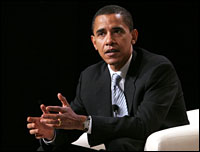Is the sting of $75-a-barrel oil and the threat of World War III exploding in the Middle East enough to convince Congress to finally boost auto fuel economy? Probably not, but a bipartisan coalition of senators led by Barack Obama (D-Ill.) is launching an admirable new effort anyway — the Fuel Economy Reform Act.

Barack Obama.
Photo: Arnold Turner/WireImage.
“It is possibly the best shot we’ve had of improving fuel economy since the Carter administration, after decades of inaction,” said Roland Hwang, vehicles policy director for the Natural Resources Defense Council.
Together with seven other senators — Joe Biden (D-Del.), Jeff Bingaman (D-N.M.), Norm Coleman (R-Minn.), Dick Durbin (D-Ill.), Tom Harkin (D-Iowa), Dick Lugar (R-Ind.), and Gordon Smith (R-Ore.) — Obama introduced legislation last week that would raise fuel-economy standards for cars and light trucks sold in the U.S. by 4 percent, or about one mile per gallon, each year. Its sponsors say the bill would reduce America’s oil consumption by 1.3 million barrels daily within a decade; that amounts to 16 percent of the current consumption of America’s passenger-vehicle fleet of 8 million barrels per day.
The legislation would significantly revamp the structure of CAFE — corporate average fuel economy — standards, which have changed little since they were enacted in 1975. Instead of setting one target that each automaker has to meet for its average fleet-wide fuel economy, the bill would allow manufacturers to meet different efficiency targets based on their fleet mix of different-sized cars and light trucks. It would create a range of weight classes for these vehicles, with different efficiency standards for each classification.
If this sounds familiar, that’s because it’s essentially the same strategy the Bush administration took when updating standards for light trucks this spring. Detroit loved the plan — particularly since the Bushies set low efficiency standards within each weight class. Enviros widely criticized the plan, arguing that it would incentivize automakers to produce heavier vehicles that could qualify for classes with looser efficiency restrictions.
But in this newly proposed form, Beltway enviros support the size-based approach. Dan Becker, director of the Sierra Club’s global-warming program and a staunch defender of CAFE, said the bill could be effective: “Automakers would have to design cars today knowing that the standard will be steadily marching upwards year after year. That will discourage, not encourage, them to up-weight the vehicles.” On the whole, said Becker, the legislation is “an impressive compromise. We’re very intrigued.”
There is one hitch, however. Becker cautions that the bill includes an “escape hatch” — language that says the Department of Transportation won’t have to impose the 4-percent-a-year fuel-economy increases if it determines that the target is not technologically or economically viable, or poses a threat to the national economy. Said NRDC’s Hwang, “The bill basically says, ‘You have to increase fuel economy unless you can prove you have a good reason not to do it.'” Becker and Hwang fear this provision could pave the way for financially strapped U.S. automakers to barrage the DOT with lawsuits.
The industry’s trade group, the Alliance for Automobile Manufacturers, is even now indicating that it doesn’t think the bill’s aims are achievable. “We already have a process in place where the government crushes all the data and comes up with a maximum feasible fuel-economy standard,” alliance spokesperson Gloria Bergquist told the Detroit Free Press last week. If the bill’s increases “were feasible today, they’d be set today.” Bergquist did not reply to Muckraker’s request for further comment.
Hwang counters that there are mountains of data showing the bill’s targets are reachable with available technology. Moreover, they could be the very economic catalysts needed to make Detroit competitive with automakers like Toyota that are producing far more efficient — and popular — cars.
Last week, the U.S. EPA released a report revealing that 2006 model-year vehicles in the U.S. got an average of 21 mpg — the same figure as last year, and lower than in 1982. General Motors sank below that number with an average of 20.5 mpg, and Ford even lower, with an average of 19.7. Meanwhile, Honda managed to pull off an average of 24.2, and Toyota came in at 23.8.
Foreign Objective
Not surprisingly, the sponsors of the Fuel Economy Reform Act are citing foreign-policy motivations for the bill rather than economic or environmental ones. “It is clear that the Achilles’ heel of the most powerful country on earth is the oil we import and cannot live without,” said Obama, who claims the legislation will “save America from a dependence on the world’s most unstable, undemocratic regimes.”
Said Biden, “Domestic energy policy is at the center of our foreign policy. For our national security, we have to begin the transition to alternative fuels. We can’t do that without making progress on fuel economy.”
Indeed, half of the act’s sponsors are on the Senate Foreign Relations Committee. “Possibly the biggest accomplishment of the bill is that it picks up votes from the hawks — Lugar, Smith, and Biden,” said Becker.
Obama said he hopes to attach the bill to GOP-backed energy legislation that is expected to be debated in the Senate this week, which would open up millions of new acres in the Gulf of Mexico to oil and gas drilling. “The only way to achieve energy security is to promote a balanced approach that addresses both production and efficiency,” Obama told The New York Times.
But while Hwang says he thinks the bill has a “50-50 chance” of passing in the Senate, Becker is not so optimistic. “I’d be lying to you if I said this had a decent chance of passing in this Congress,” he said. “The automakers’ stranglehold on Washington is too tight.”
This was evident in 2005, the last time a Senate fuel-economy measure was proposed, when a whopping 67 senators — including John Kerry and Hillary Clinton — voted against it. And though fuel-economy advocates led by Rep. Sherwood Boehlert (R-N.Y.) have recently been building steady support for a CAFE reform bill in the House, the Republican leadership has refused to allow a vote on it, fearing it might come too close to passing.
Unless there’s a dramatic shift in the congressional makeup after this November’s midterm election, contends Becker, the only hope of passing fuel-economy increases in the near future would be “a major supply disruption that sends gas prices through the roof, double or triple where they are today.” Sadly, such a disruption — which could be triggered by a terrorist attack on pipelines or refineries due to escalating conflict in the Middle East — looks more conceivable than ever.


